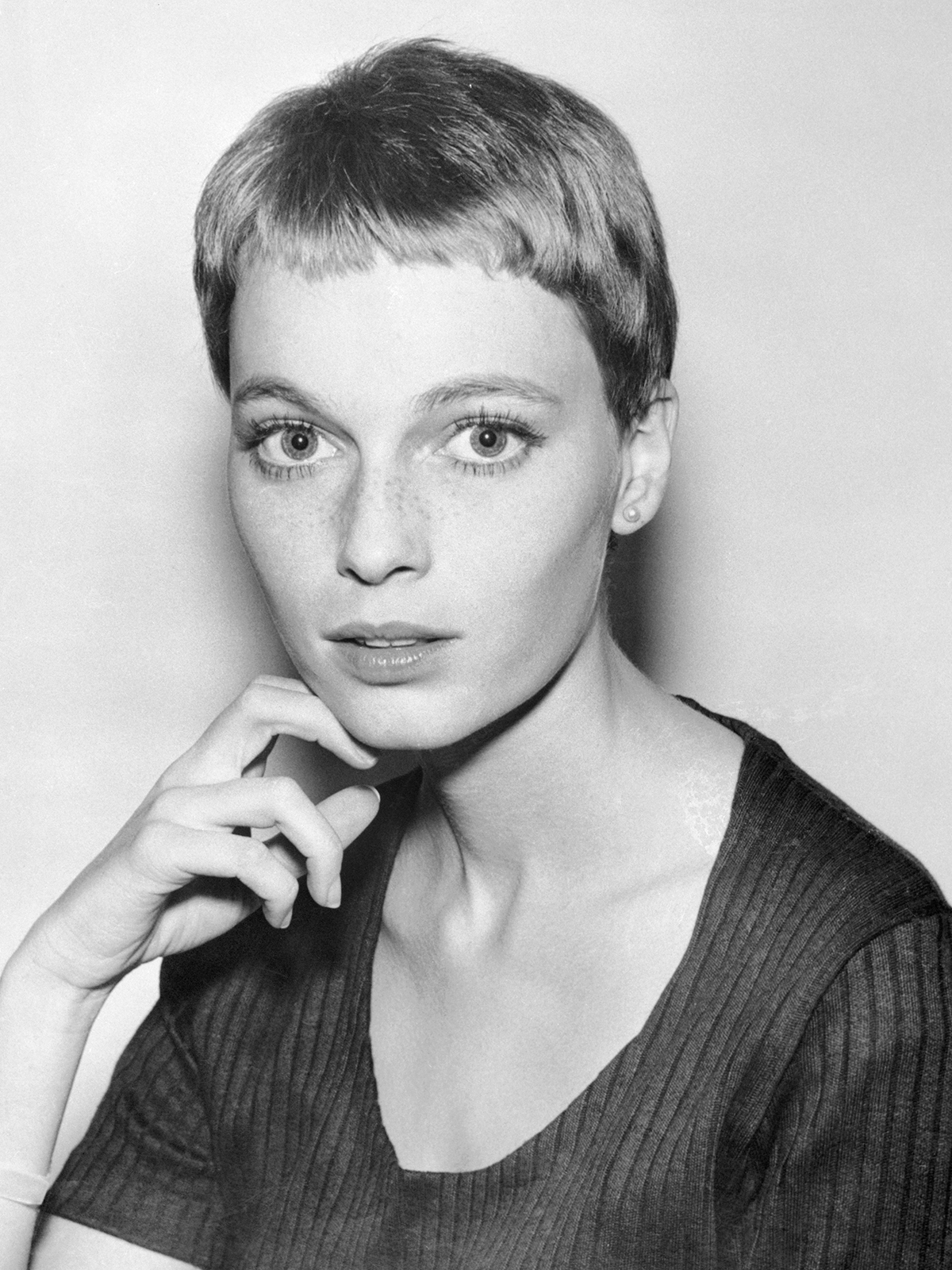
- Golden Globe Awards
Tomorrow’s Stars Yesterday: Mia Farrow, 1965
Between 1948 and 1983 Golden Globes were awarded in a special category of “New Star of the Year” conceived to recognize young actors making a mark in their early roles. In this series, the HFPA’s Phil Berk highlights those that would follow their auspicious starts with distinguished careers.
In addition to Celia Kaye of Island of the Blue Dolphins, 1965’s other New Star of the Year – Actress was Mia Farrow,
Mia was born into Hollywood royalty. Her father was Paramount’s top in-house director John Farrow, and her mother was Maureen O’Sullivan, MGM’s Jane in the Johnny Weismuller Tarzan movies. It was Mia’s minor role in Guns of Batasithat earned her the New Star of the Year Golden Globe, but it was her ethereal (the word that best describes her) performance as Allison MacKenzie in the TV version of Peyton Place that endeared her to audiences, and specifically to Frank Sinatra, who went on to marry her despite their age difference.
There is no denying that even when married to Sinatra she had kept her sights on becoming a great actress. After Peyton Place, which she left at her husband’s urging, she was cast in the charming British film A Dandy in Aspic, and then, when Rosemary’s BabyRoman Polanski who insisted on casting her – suddenly she was Hollywood’s brightest star.
She appeared opposite Elizabeth Taylor and Robert Mitchum in Secret Ceremony, and then, following her Golden Globe nomination for Best Actress in a Drama for Rosemary’s Baby, she was given the starring role opposite Dustin Hoffman in John and Mary, which earned her a second Golden Globe nomination, this time as Best Actress in a Musical or Comedy. Despite the nomination, she was unhappy with both films, so she developed other plans. Invited to join the prestigious Royal Shakespeare Company, she appeared as Joan of Arc in a production of Arthur Honegger’s Jeanne d’Arc au Bûcher, becoming the first American actress to be cast in the role. It was around this time that she met André Previn, who at the time was married to singer-songwriter Dory Previn. That marriage ended when Dory filed for divorce, shortly before Mia gave birth to her and Previn’s twin sons. Now, married to Previn and domiciled in London where her husband was conductor of the London Symphony Orchestra, she made occasional movies – the best of which was See No Evil – and also even found time to appear on stage in Mary Rose and Three Sisters; but essentially, she devoted herself to being a mother.
However, when offered the role of Daisy Buchanan in The Great Gatsby, she couldn’t refuse, and later relished the idea of working with Robert Altman on A Wedding. In both, she was entrancing, so why not follow it by joining an all-star cast in Sydney Lumet’s Death on the Nile?
By this time her marriage to Previn was falling apart, and she moved back to America, where she accepted the worst film of her career, a remake of John Ford’s Hurricane.
Her career might not have survived that disaster had Woody Allen not offered her a role in A Midsummer’s Night’s Sex Comedy, which began a ten-year collaboration becoming one of the most symbiotic in Hollywood history. Her ensemble role in that meshed perfectly with his style of acting and directing, and their follow up film, Zelig, gained Allen a much-needed critical revival. He followed it with a plum role for Mia in Broadway Danny Rose, for which again she was Golden Globe-nominated as Best Actress in a Comedy.
Their next film – this time he remained behind the camera – was Purple Rose of Cairo, one of Allen’s masterpieces, for which she was again nominated for a Golden Globe as Best Actress in a Comedy, her third such honor. Now happily married, Woody cast Mia’s mother Maureen O’Sullivan in her finest role as Hannah’s mother in yet another Allen masterpiece, Hannah and Her Sisters. The film won repeated awards as Best Film of the year, including the Golden Globe as Best Picture. Mia’s costars Michael Caine and Dianne Wiest won supporting acting Oscars.
Their next collaboration, Radio Days, was another winner, with Mia adorably playing a dopey character; incidentally, this was the first and only time she was joined on screen by Allen’s former muse Diane Keaton, and it would be Allen’s last comedy for a period of time.
During his stark drama phase, Mia was quite willing to take a back seat to Elaine Stritch in September, to Gena Rowlands in Another Woman, and even to Mae (Betty Boop) Questel in his segment of New York Stories. And in his follow-up, Crimes and Misdemeanors, perhaps the darkest of his acclaimed masterpieces, there was no role for her. But she wasn’t complaining. She was busy giving birth to Allen’s only son Satchell, later re-named Ronan Farrow, and taking care of him and her now eight kids.
When she returned to acting, he rewarded her with one of her best roles as Alice Tate in Alice, for which she was once again nominated for a Golden Globe as Best Actress in a Musical or Comedy, her fourth and last nomination in this category.
She was part of an ensemble cast in Shadows and Fog, and, then her last film with him, Husbands and Wives, which might have foreshadowed the end of their relationship.
Embroiled now in legal battles, she took time out to make a handful of forgettable films; eventually, she retired from acting and has since devoted her energy to activism, most notably as a UNICEF Goodwill Ambassador.
Her classic performances include Rosemary’s Baby, The Great Gatsby, and a handful of Woody’s films. You choose your favorite.

